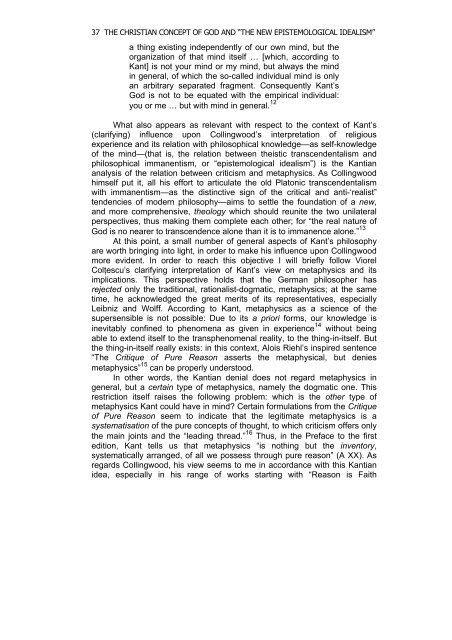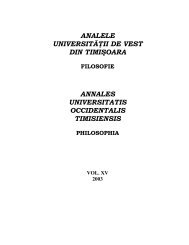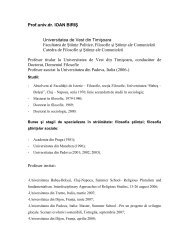VOL. IV (XXI) 2009 - Departamentul de Filosofie si Stiinte ale ...
VOL. IV (XXI) 2009 - Departamentul de Filosofie si Stiinte ale ...
VOL. IV (XXI) 2009 - Departamentul de Filosofie si Stiinte ale ...
You also want an ePaper? Increase the reach of your titles
YUMPU automatically turns print PDFs into web optimized ePapers that Google loves.
37 THE CHRISTIAN CONCEPT OF GOD AND “THE NEW EPISTEMOLOGICAL IDEALISM”<br />
a thing existing in<strong>de</strong>pen<strong>de</strong>ntly of our own mind, but the<br />
organization of that mind itself … [which, according to<br />
Kant] is not your mind or my mind, but always the mind<br />
in general, of which the so-called individual mind is only<br />
an arbitrary separated fragment. Consequently Kant’s<br />
God is not to be equated with the empirical individual:<br />
you or me … but with mind in general. 12<br />
What also appears as relevant with respect to the context of Kant’s<br />
(clarifying) influence upon Collingwood’s interpretation of religious<br />
experience and its relation with philosophical knowledge—as self-knowledge<br />
of the mind—(that is, the relation between theistic transcen<strong>de</strong>ntalism and<br />
philosophical immanentism, or “epistemological i<strong>de</strong>alism”) is the Kantian<br />
analy<strong>si</strong>s of the relation between criticism and metaphy<strong>si</strong>cs. As Collingwood<br />
himself put it, all his effort to articulate the old Platonic transcen<strong>de</strong>ntalism<br />
with immanentism—as the distinctive <strong>si</strong>gn of the critical and anti-‘realist”<br />
ten<strong>de</strong>ncies of mo<strong>de</strong>rn philosophy—aims to settle the foundation of a new,<br />
and more comprehen<strong>si</strong>ve, theology which should reunite the two unilateral<br />
perspectives, thus making them complete each other; for “the real nature of<br />
God is no nearer to transcen<strong>de</strong>nce alone than it is to immanence alone.” 13<br />
At this point, a small number of general aspects of Kant’s philosophy<br />
are worth bringing into light, in or<strong>de</strong>r to make his influence upon Collingwood<br />
more evi<strong>de</strong>nt. In or<strong>de</strong>r to reach this objective I will briefly follow Viorel<br />
Colţescu’s clarifying interpretation of Kant’s view on metaphy<strong>si</strong>cs and its<br />
implications. This perspective holds that the German philosopher has<br />
rejected only the traditional, rationalist-dogmatic, metaphy<strong>si</strong>cs; at the same<br />
time, he acknowledged the great merits of its representatives, especially<br />
Leibniz and Wolff. According to Kant, metaphy<strong>si</strong>cs as a science of the<br />
supersen<strong>si</strong>ble is not pos<strong>si</strong>ble: Due to its a priori forms, our knowledge is<br />
inevitably confined to phenomena as given in experience 14 without being<br />
able to extend itself to the transphenomenal reality, to the thing-in-itself. But<br />
the thing-in-itself really exists: in this context, Alois Riehl’s inspired sentence<br />
“The Critique of Pure Reason asserts the metaphy<strong>si</strong>cal, but <strong>de</strong>nies<br />
metaphy<strong>si</strong>cs” 15 can be properly un<strong>de</strong>rstood.<br />
In other words, the Kantian <strong>de</strong>nial does not regard metaphy<strong>si</strong>cs in<br />
general, but a certain type of metaphy<strong>si</strong>cs, namely the dogmatic one. This<br />
restriction itself raises the following problem: which is the other type of<br />
metaphy<strong>si</strong>cs Kant could have in mind? Certain formulations from the Critique<br />
of Pure Reason seem to indicate that the legitimate metaphy<strong>si</strong>cs is a<br />
systematisation of the pure concepts of thought, to which criticism offers only<br />
the main joints and the “leading thread.” 16 Thus, in the Preface to the first<br />
edition, Kant tells us that metaphy<strong>si</strong>cs “is nothing but the inventory,<br />
systematically arranged, of all we possess through pure reason” (A XX). As<br />
regards Collingwood, his view seems to me in accordance with this Kantian<br />
i<strong>de</strong>a, especially in his range of works starting with “Reason is Faith




